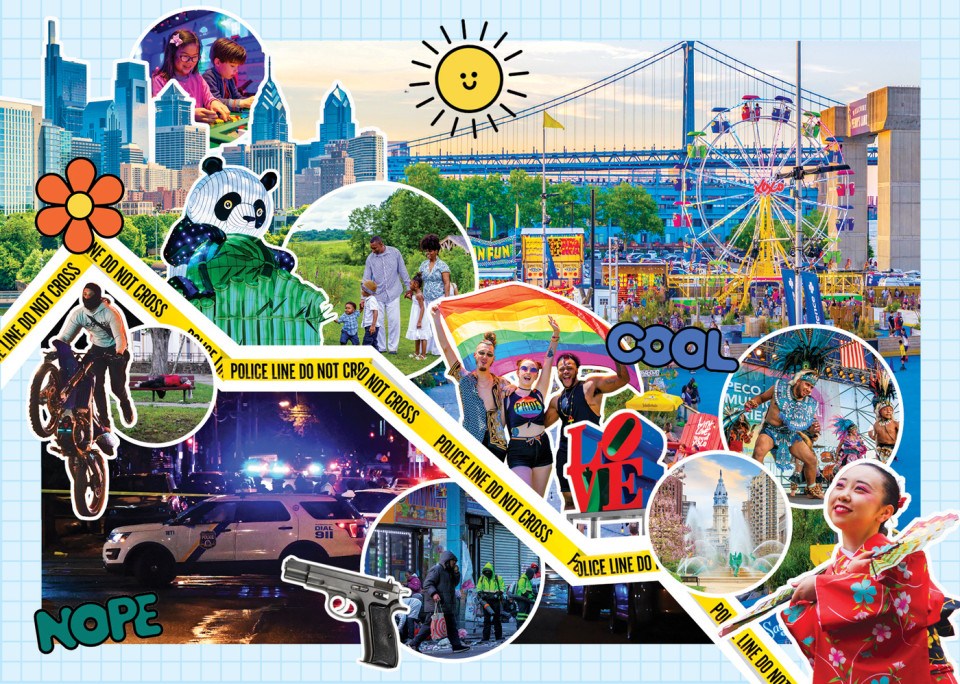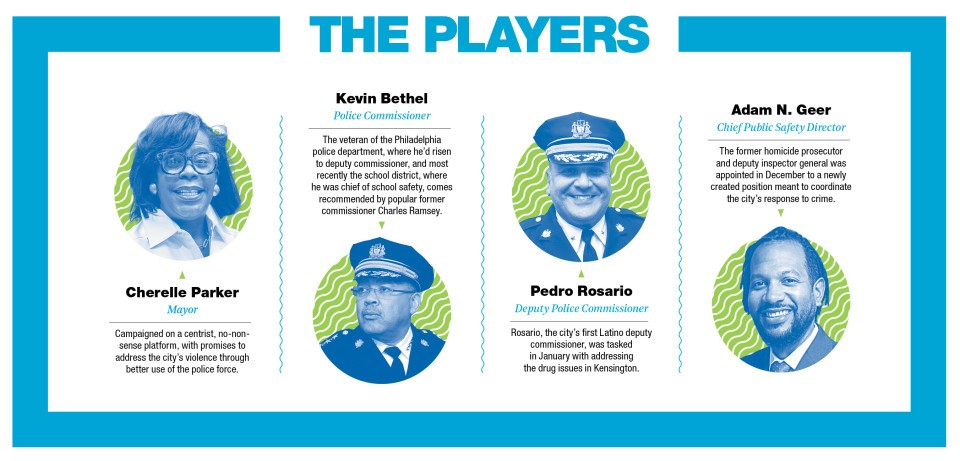Yes, Philadelphia Is Safer Than They Say on TV
The city has made the national news far too often recently for incidents involving crime and public safety. A new administration has big plans to change — and correct — the narrative.

Philadelphia’s public safety — from guns to ATVs to retail crime — is changing for the better. / Photo-Illustration by Leticia R. Albano; photographs via Visit Philly, AP and Getty Images
There are many memorable scenes in Martin Scorsese’s dark but gorgeously filmed 1976 movie Taxi Driver, in which Robert DeNiro plays a New York City cabbie who’s both physically and psychologically repulsed by the decaying metropolis in which he’s drowning. He watches crimes as they unfold and prays that a “real rain will come and wash all this scum off the streets.”
If you’ve been a regular viewer of local TV news over the past few years — and especially if you’re a fan and follower of Fox 29 if-it-bleeds-it-leads reporter Steve Keeley — it’s easy to feel this way about Philadelphia. I have many suburban friends who routinely ask me questions like, “What’s going on this weekend?” and “Where should we have dinner next week?” More recently, though, those questions frequently are suffixed by the phrase “ … but not in the city.” Tragic.
True, Philly has seen an ominous surge in gun violence and other types of crimes. These trends were echoed in most other major cities and driven, in part, by the pandemic — but weren’t helped at all by a totally checked-out mayor and an utter breakdown in the relationship between our police department and hyper-progressive District Attorney Larry Krasner. But we have a new mayor. We have new public safety officials. And the fact is: Things are changing. Here, a look at four major categories of crime and why there’s reason for hope.
The Gun Crisis
We thought things were bad in 2006. That’s when Philadelphia recorded 406 homicides in one year, the most we had seen in a decade. But before long, homicide numbers started trending downward, bottoming out at 246 in 2013 before ticking up again and eventually landing at 353 in both 2018 and 2019. Then 2020 happened.
Along with an unprecedented global health crisis came unprecedented homicide statistics. We managed to stay just one murder shy of 500 in 2020 but easily exceeded that in a still-tumultuous 2021, with 562 homicides. In 2022, the count dipped to 514 — a decrease, though hardly worth celebrating. But 2023 seemed to signify that true change was in the air, with 410 homicides recorded — still more than we saw in 2006, but a drastic and welcome decline from the peak in 2021.
It’s too early in 2024 to know where we’ll end up. But as of the beginning of April, Philadelphia had seen 34 percent fewer homicides compared to the same period last year. If that percentage were to hold — and that’s a big if, but hardly impossible — we’d end the year with around 270 homicides. That would be the fewest in a decade. Additionally, overall shooting victims (including those who survive, which are by far the majority) are way down, with fewer recorded in each month so far this year than in any month since February 2019.
Any expert on the subject will tell you that truly solving the homicide problem isn’t possible with the easy availability of guns in America, not to mention systemic scourges like intergenerational poverty and a criminally underfunded public-education system. And it’s not exactly clear how Mayor Cherelle Parker plans to fully address those issues. But what is clear is that she hopes to use law enforcement more effectively and more voluminously to keep the numbers at bay.
In late February, the Philadelphia police department unleashed a new unit, the Mobile Surge Team, which deploys extra officers to known violent-crime hot spots on Friday and Saturday nights. Throughout this year, the city has plans to install 200 new officers, beginning with 51 this month, to help make up for a drastic shortage of squad cars on the streets, as well as to launch a new community-policing initiative to engage with people in high-risk neighborhoods before they’re pulling out guns. It doesn’t hurt that Parker is a truly inspirational speaker who seems to connect with the public even more than did, say, Ed Rendell, and one who effectively communicates the message: We really don’t have to be this way. Not only that — we can’t be.
Those Damn Bikes
Let’s be clear about one thing: The vast majority of people riding dirt bikes and ATVs around the city aren’t breaking any laws other than the ban on said vehicles. While incidents of violence and other crimes have happened during these en masse processions, they’re few and far between.
Still, being surrounded by dozens or hundreds of bikes when you’re in your car or hearing them throttle through your residential neighborhood at 2 a.m. can be unnerving. And the videos of hundreds of bikers swarming the streets — videos that inevitably wind up going viral — don’t exactly help our image. They make Philadelphia seem lawless.
For years, officials didn’t seem to know what to do about the marauding bikers, and it wasn’t even clear that they wanted to do anything. One person changed all that.
Google the name “Cody Heron,” and you’ll be reminded of the chaotic incident last October when Heron was riding his motorcycle at night in a pack near City Hall. For reasons that still aren’t entirely clear, he wound up smashing out the rear window of a car that had two kids in the back seat. The mother got out and confronted him. He pulled a gun on her. Thank God nobody was injured.
All of this was caught on video, which made national news. Krasner’s office threw the book at Heron, and when Heron’s lawyer asked a judge to reduce the already-high bail, the judge actually increased it. Heron recently pleaded guilty to aggravated assault.
The incident was so notorious that it marked a turning point in the city. The public said enough is enough with the wild bikers.
Parker made it clear to Police Commissioner Kevin Bethel, whom she tabbed in November, that the police department needed to step up its efforts to combat illegal biking — efforts that are generally limited to confiscation and the issuance of a code violation. On the first day this year to breach 60 degrees, the police ATV unit confiscated 15 bikes in under two hours. A drop in the bucket, yes, but it no doubt sent a message: More confiscations are coming.

Kensington
It’s been called the largest open-air drug market on the East Coast. People shoot up — in their necks, in their toes — right on the street. Political candidates including Dr. Oz and Vivek Ramaswamy like to show up there for photo ops to make the point that liberal leadership has put Philadelphia on the brink of ruin.
Kenney and former police commissioner Danielle Outlaw took a more or less hands-off approach to Kensington. But Parker hasn’t. She campaigned on cleaning it up, even going so far as to say that she’ll bring in the National Guard.
The National Guard hasn’t shown up just yet, which is probably a good thing. But Parker did create a new deputy police commissioner position, naming longtime Kensington-area police captain Pedro Rosario to the post. His main focus: Kensington.
“It’s something that’s been taking place for decades,” Rosario said at an event in January. “What do I think success is? Let me make this very basic for you: For all the parents in the room, anyone who has driven by Kensington, it’s not something I would ever want to subject my two daughters to. What makes it okay for it to be happening here?”
The Pennsylvania Attorney General’s office is also involved in the battle over Kensington, performing a large military-style drug raid in February that involved camouflaged agents seizing fentanyl and guns, among other contraband. And the police department began conducting its own new operations in recent weeks, the tactics and results of which aren’t exactly yet clear.
This sudden influx of law-enforcement activity in Kensington is a welcome change for some residents and business owners. Others are concerned about where it all might lead, the alarming specter of National Guard troops looming in their minds. And will the efforts in Kensington just move all the drug activity to another neighborhood?
We’ll start seeing what this looks like very soon. On April 3rd, Parker signed a new bill forcing certain types of businesses on specific blocks in Kensington to close by 11 p.m. every night. And Police Commissioner Bethel and Rosario are expected to deliver a comprehensive plan for Kensington to Parker this month.
Retail Crime
Shoplifting was long considered the pettiest of crimes. But along with 2020’s civil unrest came looting, some of which had nothing to do with police brutality, and a surge in individual instances of retail theft. And the surge continued long after the civil unrest was over.
In 2021, retail theft was up 30 percent. In 2022, it was up 52 percent over that. And the numbers just continued to grow in 2023, with a jump of another 28 percent. The large-scale looting certainly died down from what we saw in 2020, but last September, another round of looting, which spread all over the city, made national news.
Some stores claim to have closed as a result of the wanton acts, which included not just shoplifting but also armed robberies, and Wawa pulled back from Center City over these issues. Some retail-crime incidents have turned deadly.
All the while, District Attorney Krasner had garnered a reputation for playing softball with retail-theft suspects. Krasner’s office has insisted this was an unfair characterization, but he is clearly taking steps to change the narrative. In early February, two months after a shoplifter killed a security guard at the Center City Macy’s — which reported 250 instances of retail theft in 2023 — Krasner announced a task force devoted to retail theft. Krasner said the task force will be focused on repeat offenders and fencing operations.
>> Click here to return to An Optimist’s Guide to Philadelphia
Published as “Philadelphia Is Safer Than They Say on TV” in the April 2024 issue of Philadelphia magazine.


